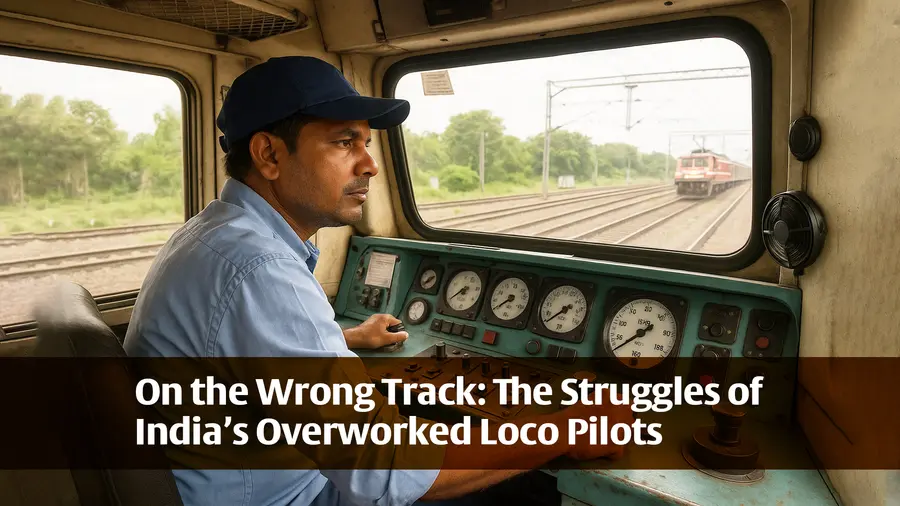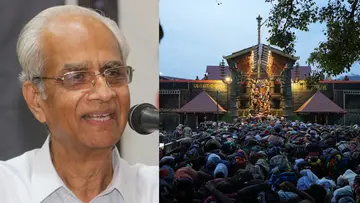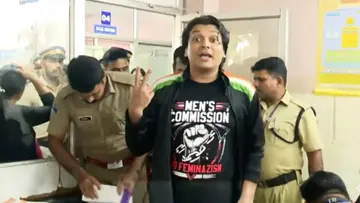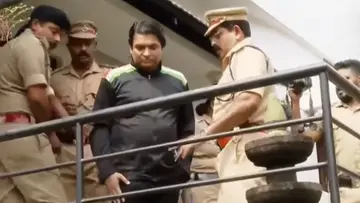With Vacancies Unfilled, Loco Pilots Bear Double the Burden


Anjali Ganga
Published on Apr 29, 2025, 03:58 PM | 5 min read
Sunita (name changed), a loco pilot with Indian Railways for over 10 years, describes her experience as a “roller-coaster ride.” While the job has given her financial stability, it has come at a significant cost to her health. Due to the lack of rest breaks and bathroom facilities, she has suffered frequent urinary tract infections. The absence of air conditioning and personal space in loco cabins further compounds the difficulties faced by loco pilots, especially women.
Poor Working Conditions and Health Risks
“During my menstrual cycle, changing a sanitary napkin is the hardest part,” Sunita explains. “There is no personal space in the cabin. Sometimes I have to travel five hours just to find a place to pee. I stop drinking water to avoid the urge.” Even when stations are reached, restroom facilities are often unavailable or far from the platform, forcing her to rush in and out within minutes.
Despite a 2016 directive from the National Human Rights Commission to install toilet facilities in loco cabins, the Railway Board continues to reject the proposal, calling it “not operationally feasible.” While the government claimed modification efforts were underway, little progress is visible.
Long Hours, Short Rest, and Denied Leave
Currently, Indian Railways employs over 10,0000 loco pilots, including 2,162 women. The duty period for those operating goods trains has increased from 104 to 125 hours per fortnight. Express and mail train pilots may see similar increases. While regulations prescribe 16 hours of rest at headquarters and 8 hours at outstations, pilots often receive only 14 and 6 hours, respectively. Leave applications are frequently denied—even in urgent cases. For example, a loco pilot in Mangaluru had to seek intervention from the All India Loco Running Staff Association (AILRSA) to obtain leave for his wife''s childbirth. These practices, already common in Southern Railway divisions, are spreading to other zones.
Shortages and Rising Workload
The Railways currently face a shortage of 32,924 loco pilots. Despite this, only 9,970 vacancies have been listed for recruitment. This staffing shortfall puts enormous pressure on the existing workforce, who are being asked to take on additional shifts and longer duty hours. Loco pilots are denied not just rest and bathroom access, but also food breaks. They are forced to rely on snacks from platform tea stalls, with no allotted time for proper meals. Delays are not tolerated, pushing pilots to skip food and rest altogether. This relentless pressure impacts both physical and mental health.
Women employees face even more discrimination. Maternity and childcare leave are often denied under the excuse of staff shortages. Pregnant women entitled to six months of maternity leave and two years of childcare leave are regularly refused. Lactating mothers are sometimes required to work for up to three days straight, leaving their infants at home.
K Radhakrishnan MP Raises Railway Staff Rest Issue in Parliament
CPI M MP K Radhakrishnan from Alathur, Kerala, has raised the issue in Parliament, urging Lok Sabha Speaker Om Birla to refer the matter to the Petitions Committee. He highlighted the non-implementation of mandated rest periods under the Indian Railway Servants (Hours of Work and Rest) Rules, 2005, and judicial directives supporting these norms. "The denial of proper rest has led to fatigue, mental stress, and operational safety concerns,' Radhakrishnan wrote, citing a Regional Labour Commissioner’s order in Bangalore that the Railway Ministry has failed to enforce.
While forwarding the representation of the All India Loco Running Staff Association (AILRSA) regarding their grievance concerning the dispute with the Railway Ministry over weekly/periodical rest, Radhakrishnan sought Birla's help for its resolution.
"The association has highlighted issues related to the non-implementation of their entitlement to 16 hours headquarter rest along with 30 hours periodical rest, as prescribed under the Indian Railway Servants (Hours of Work and Rest) Rules, 2005 and other judicial pronouncements,' Radhakrishnan said in a recent letter to Birla. He added, "The workers have expressed their distress over the denial of their rightful rest periods, which has led to severe fatigue, mental stress, and operational safety concerns.' Radhakrishnan also highlighted the order of the regional labour commissioner, Bangalore along with its subsequent upholding by judicial authorities, and alleged that the Ministry of Railways has not implemented the prescribed provisions for rest.
The plight of India’s loco pilots underscores a deeper crisis in workforce management within Indian Railways. Despite their critical role in ensuring the country’s transportation lifeline, loco pilots continue to endure unacceptable working conditions—marked by health risks, long hours, denial of basic rights, and inadequate support for women. It is imperative that the government not only fills the massive number of vacancies but also implements humane and safe work policies. Without timely intervention, the health, dignity, and safety of thousands of railway workers—and the public at large—will remain at risk.
Zone | Vacancies |
Southern Railway | 973 |
Central Railway | 1949 |
East Coast Railway | 2308 |
East Central Railway | 1931 |
Eastern Railway | 895 |
North Central Railway | 2797 |
North Eastern Railway | 674 |
North East Frontier Railway | 956 |
Northern Railway | 1174 |
North Western Railway | 2539 |
South Central Railway | 3163 |
South East Central Railway | 3075 |
South Eastern Railway | 3236 |
South Western Railway | 1673 |
West Central Railway | 2773 |
Western Railway | 2583 |
Metro Railway Kolkata | 225 |










0 comments